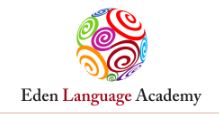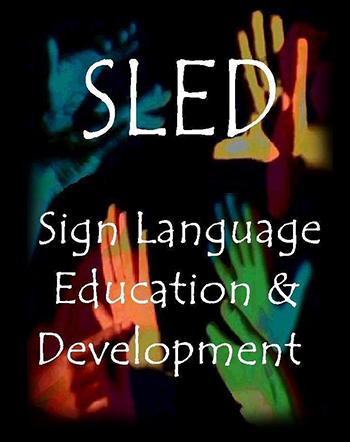Learn to communicate and understand Deaf and hard of hearing people through the use of SASL.

South Africa needs more people who are fluent users of SASL and have an appreciation of Deaf culture. SASL is a complete language with its own grammar, vocabulary and syntax. Like any other language, SASL can communicate a potentially infinite number of ideas.
SASL is a first language for the Deaf community, but there are hearing people who communicate through sign language with children, friends and family who are deaf. SASL is about to be recognised as an official language - view the SASL timeline.
Our courses have trained facilitators, who are native signers and have been further trained to teach hearing and non-hearing students.
South African Sign Language: Beginner
By the end of the course, students will be able to:
Use limited SASL vocabulary but correct finger spelling and basic sign language structure.
Interact in SASL in a simple way, using simple phrases to describe, discuss and ask about everyday topics, as well as topics associated with areas of immediate need (including greetings, talking about the family, occupations, daily routines and social arrangements).
Ask and answer questions.
Engage in short conversations with a Deaf person and groups on a familiar topic using South African Sign Language (SASL)
Demonstrate the production and reception of one hand finger-spelling alphabet
South African Sign Language: Elementary
By the end of the course, students will be able to:
Describe familiar people, places and events, holiday destinations and the weather.
Ask about and give personal descriptions of oneself and others,express likes and dislikes, and ask for and give directions
Request information and permission.
Conduct short personal interactions.
Deliver a monologue of not less than three minutes on familiar topics, such as personal information, social information, and/or general information about people and things within the person’s own experience, or specific situations or topics that have been well rehearsed.
Deliver a monologue to a known audience on a familiar topic using SASL.
Perform everyday communicative tasks using SASL.
South African Sign Language: Pre-intermediate Module A
By the end of the course, students will be able to:
Communicate and maintain short conversations to describe events, people and objects in simple terms and maintain communication that deals with the direct exchange of information, as well as the recounting of a signed conversation
Understand specific predictable information in everyday conversations on a familiar topic
Understand short, simplified signed monologues
Ask questions about a signed monologue on a familiar topic, in preparation for paraphrasing it
Summarise the main points of a short simple, signed text, using role shift where necessary.
Recount a signed conversation on a simple topic, using South African Sign Language.
Paraphrase and summarise signed monologues on familiar topics using South African Sign Language.
South African Sign Language: Pre-intermediate Module B
By the end of the course, students will be able to:
Hold conversations with Deaf individuals and groups of Deaf people, on familiar and unfamiliar topics and activities.
Use a series of correctly-structured phrases to describe family and other people, living conditions, educational background and current or most recent job.
Maintain communication that deals with both direct and indirect exchange of information.
Explain complex processes to Deaf individuals and groups of Deaf people using SASL.
Understand the main point of short, clear visual input, such as short, signed conversations.
Understand specific predictable information in everyday signed conversations, as well as short, signed monologues that deal with unfamiliar topics.
Hold conversations with Deaf individuals and groups of Deaf people on an unfamiliar topic using SASL.
Explain complex processes to Deaf individuals and groups of Deaf people, using South African Sign Language.
South African Sign Language: Intermediate
By the end of the course, students will be able to:
Communicate regarding specific concrete and abstract tasks requiring a sustained exchange of information on topics and activities using SASL.
Use a series of correctly structured phrases to discuss a practical problem and offer a solution using SASL.
Describe and facilitate the completion of complex arrangements with Deaf individuals and groups of Deaf individuals.
Demonstrate understanding of sustained signed conversations relating to areas of general relevance as well as unfamiliar topics that are delivered clearly by first-language signers.
Build on previous knowledge of Deaf culture acquired up to intermediate level, and demonstrate knowledge of technology, services and education for the Deaf in South Africa.
Make complex arrangements with Deaf individuals and groups of Deaf people, using South African Sign Language.
Discuss a practical problem and offer a solution, using South African Sign Language.
Demonstrate knowledge of Deaf Culture, the Deaf community and technology, services and education for the Deaf in South Africa.
South African Sign Language: Upper Intermediate
By the end of the course, students will be able to:
Deal with most situations likely to arise when speaking to first language speakers on familiar topics, i.e. enter unprepared into conversation.
Ask questions and paraphrase a signed monologue on an unfamiliar event or topic using a series of correctly structured phrases.
Summarise the main points of a signed text on an unfamiliar topic using South African Sign Language.
Deliver a variety of prepared presentations and answer questions relating to an unfamiliar event or topic using South African Sign Language.
Demonstrate understanding of sustained signed conversations and monologues relating to abstract and/or unfamiliar topics or events.
Narrate a story or relate the plot of a book or film and describe their reactions.
Understand the main points of signed TV programmes on current affairs or topics of personal or professional interest, including fictional narratives.
Deliver a variety of prepared presentations and answer questions related to an unfamiliar topic using South African Sign Language.
Paraphrase and summarise a signed presentation on an unfamiliar topic using South African Sign Language.
Qualification
Certificate of Competence
Innovative and communicative language courses, offered at all levels. Learn IsiZulu, French, Mandarin, Portuguese, Spanish, Sign Language and more - we offer a wide range of language courses for individuals and corporates.

South African Sign Language (SASL) is the primary sign language used by deaf people in South Africa. SASL is not entirely uniform and continues to evolve. Due to the geographical spread of its users and past educational policies, there are localised dialects of SASL and signs with many variants.

Learn to communicate and understand Deaf and hard of hearing people through the use of SASL SASL is a valuable language. South Africa needs more people who are fluent users of SASL and have an appreciation of Deaf culture.

In an effort to support learners with special needs, the DBE has requested Schools for the Deaf to host the Spring School Programme at their respective sites. To this end, the curriculum team developed scripted/signed lesson plans for use by schools for the Deaf during the Spring School Programm...

Upon finishing this course, participants will gain insights into Deaf culture and learn effective ways to interact with Deaf individuals. They will become proficient in identifying South African Sign Language (SASL)

South African Sign Language workshop is offered by SLED. Workshops for teachers and teaching assistants in teaching South African Sign Language literature (stories, poems etc). Workshops are dynamic and include direct engagement with the SASL text and classroom based options.
© 2025 coursetakers.com All Rights Reserved. Terms and Conditions of use | Privacy Policy